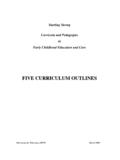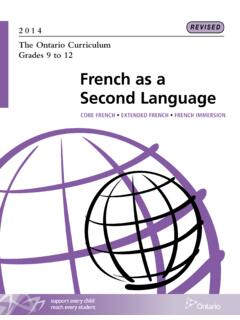Transcription of Handbook for Curriculum Assessment
1 Handbook forCurriculum Assessment Winter 2006 Peter Wolf Manager, Instructional Development, Teaching Support Services Art Hill, Professor, Department of Food Science Fred Evers, , Sociology and AnthropologyDirector, Educational Research & Development Unit Table of Assessment : Overview ..3 Situating Curriculum Assessment within a Curriculum Development Framework ..5 Kirkpatrick s Four Levels of Evaluation ..8 Combining Wolf s Curriculum Development Process and Kirkpatrick s Four Levels of Case Study ..12 Summary ..17 Appendix 1: Curriculum Assessment Plan: Bachelors of Arts & Sciences.
2 18 Appendix 2: Curriculum Assessment Plan: Guelph Humber University ..20 References ..25 Handbook for Curriculum Assessment IntroductionThis Handbook is primarily aimed at departments, faculties and programme committees that need qualitative and quantitative data to answer the question How is our Curriculum doing? Sometimes this kind of information-gathering exercise is precipitated by a sense that change is due. Perhaps your Curriculum has been evolving naturally for many years doing its good work, but you re not sure what precisely its good work might be.
3 For some departments, enrolment growth or other changes demand some introspection about what is hoped students will have learned after completing their studies. We ve also had departments and whole faculties ask us to help with the How is our Curriculum doing question several years after a major Curriculum change to see if the intended objectives were achieved. As well, change is sometimes driven by the formal review processes at the undergraduate and graduate levels (either in anticipation of one or as a response to feedback from reviewers). In the end it matters little what drives the introspection and feedback-seeking as long as stakeholders become engaged in the process.
4 Done properly, Curriculum Assessment actually helps to seed a culture of engagement, an ethos of conscious and intentional reflection and transformation. Ours is not the only approach, but it has proven resilient and effective so far. What we can offer is a set of processes that have been eye-opening and engaging in our work with the academic units in which we have been involved. Elements of the overall approach have been very successful in isolation, but taken together, we feel strongly that they enrich the teaching and learning landscape in ways that few other activities to use this handbookIncluding theory, application, supporting resources and a case study (it is real), the Handbook presents a model that has been implemented, refined, and presented at education-related conferences.
5 Whether you begin with the model or read the case study first, the figures and accompanying explanation are intended to provide a framework within which all else makes sense. Finally, the matrices and questionnaires are provided for your own use or adaptation. AcknowledgementsA project like this can only come to fruition in a collaborative, committed environment. The authors would like to thank Teaching Support Services; Julia Christensen Hughes for her conceptual expertise, Louise Solda for countless hours acting as note-taker, Trevor Holmes for his keen editing and Doug Schaefer who provided his layout and design expertise with characteristic flair.
6 Specific to the appendices, the authors would also like to thank Donna Penne and Patricia Tersigni of the Bachelors of Arts & Sciences programme as well as Janet Mitchell of the Educational Research and Development Unit. Handbook for Curriculum Assessment2 Handbook for Curriculum Assessment Curriculum Assessment : An OverviewWhat is Curriculum Assessment ? Curriculum Assessment is a process of gathering and analyzing information from multiple sources in order to improve student learning in sustainable bother assessing Curriculum ? Curriculum Assessment can serve several major purposes: To identify aspects of a Curriculum that are working and those that need to change To assess the effectiveness of changes that have already been made To demonstrate the effectiveness of the current programme To meet regular programme review requirements To satisfy professional accreditationsHow can the information gathered be used?
7 The information gathered as part of a Curriculum Assessment can be used to inform Curriculum changes in several areas, including: Curriculum /Course Design Curriculum /Course Delivery Assessment Learning Environment OtherWhen is Curriculum Assessment effective? Curriculum Assessment efforts are generally effective when: Viewed as a comprehensive, integral, systematic, and continuous activity Viewed as means for self-improvement Measures are meaningful Multiple measures sources are used Results are valued, and are genuinely used to improve programs and processes Involves the participation and input of faculty, staff, and students Focuses on the programme, not on individual performance of educators Handbook for Curriculum Assessment Who can act as information sources when assessing Curriculum ?
8 Students (applicants, undergrads, grads, alumni) Faculty TAs Staff Employers Professional Associations (certification/accrediting bodies) Colleagues from similar programs elsewhereWhat feedback methods can be used to assess Curriculum ? Opinion Gathering Surveys Focus groups Interviews Department meetingsTesting Written Demonstration Pre and post Control groupContent Analysis Student and faculty journals Concept mapping Completed assignments/examsExpert Advice Tours External reviewers Expert speakersArchival Data Course outlines Course evaluations Student grades Past curricular reports(some sections have been adapted from Selim, B and Pet-Armacost, J, 2004.)
9 Program Assessment Handbook , University of Central Florida) Handbook for Curriculum Assessment Situating Curriculum Assessment Within a Curriculum Development FrameworkCurriculum development can be thought of as a series of iterative steps. Figure 1 (on page 7) represents the ideal process for Curriculum development. All of the steps involved in Curriculum development will help each smaller step in the Curriculum Assessment process. The intent is to see the link between any individual course or even any one class in which a student might be engaged and the mission, needs and strengths of the programme Needs & Strengths of the University/College/ProgrammeConsider this as the frame for the model.
10 Everything within the Curriculum development process is shaded by the needs for the programme and the strengths of the unit developing it. It is important to have an understanding of the strengths and opportunities presented by canvassing the interests and abilities of those who will be the educators. These strengths are put beside the needs of those students who might be motivated to participate in the programme. It is also important to take note of where the programme might lead for those graduates ( employment, further studies, accrediting bodies, etc.).



